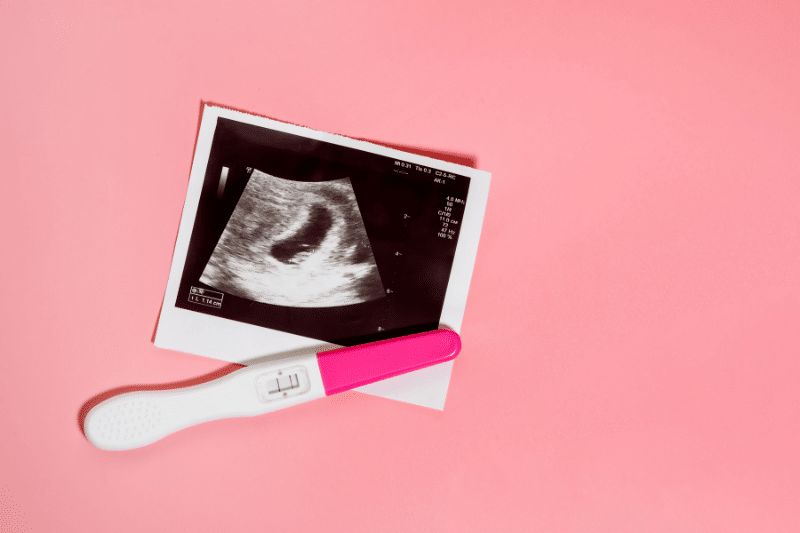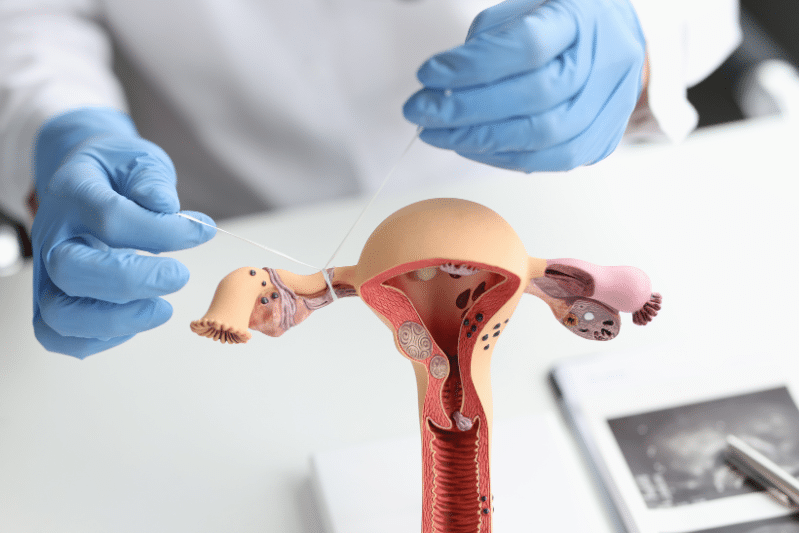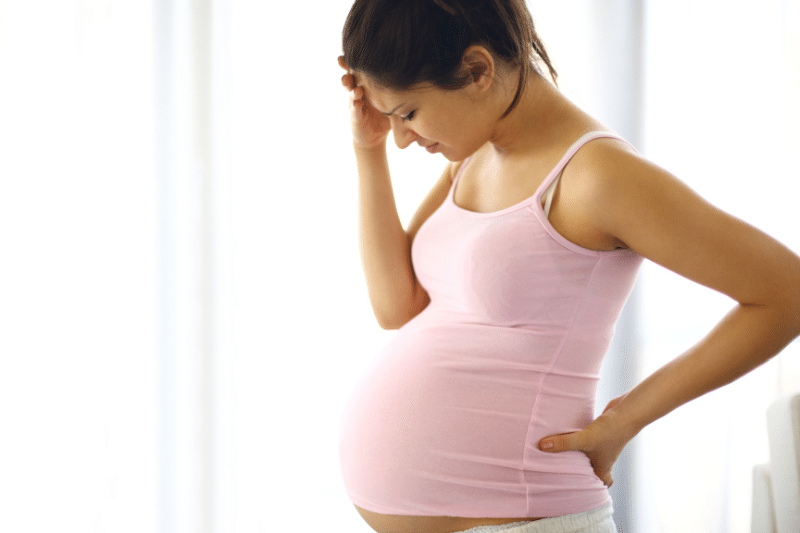An ectopic tubal pregnancy occurs when a fertilized egg implants itself outside the uterus, most often in the fallopian tube. Although rare, this can be life-threatening if not treated quickly.
According to the American Pregnancy Association, 1 in 50 pregnancies (2%) is ectopic in the US.
Ectopic Tubal Pregnancy Overview
An ectopic pregnancy occurs when a fertilized egg implants outside the uterus, most often in one of the fallopian tubes. This condition can cause serious complications and requires prompt medical attention to prevent risks to the mother’s health. Gynecologists refer to it as a tubal pregnancy, which is the majority of ectopic tubal pregnancies.
Another type of ectopic pregnancy is the cesarean scar ectopic pregnancy (CSEP), where a fertilized egg implants scar tissue from a previous cesarean section. This type of ectopic pregnancy carries significant risks, including the potential for the scar tissue to tear, leading to heavy bleeding.
According to NIH study, worldwide the incidence of ectopic pregnancies ranges from 0.25% to 2% of all pregnancies depending on the region and healthcare system. Early diagnosis and intervention are key as an embryo in the fallopian tube can rupture the tube causing severe internal bleeding and even death.
What is the Main Cause of Ectopic Pregnancy?
The main cause of an ectopic pregnancy is a blockage or narrowing of the fallopian tubes so the fertilized egg can’t reach the uterus. Several factors such as pelvic inflammatory disease (PID), previous surgery on the two fallopian tubes themselves, and endometriosis can cause these blockages.
Can It Be Detected Through Home Pregnancy Tests?
Home pregnancy tests can confirm pregnancy, but they cannot differentiate between an ectopic and a normal pregnancy. These tests detect the hormone human chorionic gonadotropin (hCG), which is present in both types of pregnancies.
How Common is an Ectopic Pregnancy Compared to Other Types of Pregnancies?
As I mentioned earlier, ectopic pregnancies occur in about 1-2% of all pregnancies. This is increasing due to higher rates of pelvic inflammatory disease (PID), tubal or tubal ligation reversal surgery, and assisted reproductive technologies. Remember, while rare, ectopic pregnancies are serious and doctors advise treating them as emergencies.
What is a Heterotopic Pregnancy and How is it different from an Ectopic Pregnancy?
A heterotopic pregnancy is a rare condition where one embryo implants in the uterus while another embryo implants outside the uterus, typically in a fallopian tube. This results in a combination of a normal intrauterine pregnancy and an ectopic pregnancy.
Both pregnancies develop at the same time but the ectopic pregnancy is non-viable and needs immediate medical treatment. Furthermore, uterine pregnancy can sometimes continue safely.
What Is a Heterotopic Pregnancy and How Is It Different from an Ectopic Pregnancy?
A heterotopic pregnancy is a rare condition in which one embryo implants in the uterus, while another implants outside, typically in a fallopian tube (ectopic pregnancy). While both pregnancies develop simultaneously, the ectopic pregnancy is non-viable and requires immediate treatment, while the uterine pregnancy can sometimes continue safely.
The chances of heterotopic pregnancy are about 1 in 30,000 spontaneous pregnancies, but the odds increase significantly with assisted reproductive techniques like in vitro fertilization (IVF), where the rate is as high as 1 in 100 pregnancies.
However, an ectopic pregnancy typically has lower-than-normal levels of hCG, which can signal to healthcare professionals the possibility of an ectopic issue. Only a healthcare provider, using ultrasound and blood tests, can accurately diagnose the symptoms of an ectopic pregnancy.

Ectopic Tubal Pregnancy – Causes, Signs, and Symptoms
What Diseases Cause Ectopic Pregnancy?
The most common condition leading to ectopic pregnancy is pelvic inflammatory disease (PID). This disease is often caused by sexually transmitted infections (STIs) like chlamydia and gonorrhea, which can lead to scarring in the fallopian tubes. Additionally, conditions like endometriosis or prior surgeries involving the fallopian tubes can also increase the risk factors of developing an ectopic pregnancy.
What Are the Most Common Causes of Ectopic Pregnancy?
Some of the leading causes include:
-
Scarring from previous tubal surgery or procedures, such as sterilization (tubal ligation).
-
Inflammation from sexually transmitted infections.
-
Congenital abnormalities in the fallopian tubes.
-
Smoking increases the risk by affecting the function of the fallopian tubes.
-
Assisted reproductive technologies (ART), such as IVF, can increase the likelihood of ectopic pregnancies.
What Are the Positive Signs of a Ruptured Ectopic Pregnancy?
A ruptured ectopic pregnancy is a medical emergency. Some critical signs include:
-
Sudden, severe abdominal pain on one side.
-
Dizziness or fainting due to blood loss.
-
Shoulder pain, which can occur due to internal bleeding irritating the diaphragm.
-
Rapid pulse and paleness due to shock.
If any of these symptoms occur, seek immediate medical attention.
What are the 3 Signs of an Ectopic Pregnancy?
The usual symptoms are:
-
Abdominal or pelvic pain, on one side.
-
Vaginal bleeding, lighter or heavier than your period.
-
Shoulder pain or pain during bowel movements, which means internal bleeding.
These can vary in intensity so monitor anything unusual during early pregnancy and see a healthcare provider ASAP.
What Are the Other Symptoms?
While the usual symptoms are abdominal pain and severe bleeding below, the other symptoms are:
-
Bowel issues, diarrhea, or gas pain.
-
Shoulder pain (as mentioned above).
-
Low back pain, which can be mistaken for other things.
These don’t necessarily mean an ectopic or pregnancy test, so they are often ignored.

Ectopic Tubal Pregnancy – Detection and Diagnosis
How Early Can an Ectopic Pregnancy Be Detected?
Ectopic pregnancies can typically be detected as early as 6 to 8 weeks into the pregnancy. By this time, most healthcare providers can use transvaginal ultrasounds to determine the location of the pregnancy. In some cases, hCG levels may be monitored over time. If hCG levels are rising too slowly, it may indicate an early ectopic pregnancy too.
How Do I Know if I’m Having an Ectopic Pregnancy?
You may suspect an ectopic pregnancy if you’re experiencing one-sided pelvic pain, vaginal bleeding, or unusual shoulder pain. A missed period combined with these symptoms should prompt a visit to your healthcare provider, who will confirm the ectopic pregnancy diagnosis with blood tests and an ultrasound.
What Tests Are Used to Diagnose an Ectopic Pregnancy?
The most common diagnostic tests include:
-
Blood tests to measure hCG levels.
-
Transvaginal ultrasound, which gives a clear image of the pelvic area to determine if the pregnancy is in the uterus or outside of it.
-
Pelvic examination to check for tenderness or masses in the pelvic area.

Ectopic Tubal Pregnancy – Survival and Outcomes
Can a Woman Still Have a Baby with an Ectopic Pregnancy?
While the embryo in an ectopic pregnancy cannot survive, most women can still conceive and carry future ectopic pregnancies happen them to term, especially if they receive prompt treatment. However, the risk of recurrence increases, especially if the fallopian tubes are damaged or removed.
Do Ectopic Pregnancies Ever Survive?
Unfortunately, no, an ectopic pregnancy cannot result in a viable birth. The location outside the uterus not equipped to support a growing fetus, and continuing the symptoms of an ectopic pregnancy poses severe health risks to the developing fetus and the mother.
Can a Fetus Survive a Tubal Pregnancy?
No, a fetus cannot survive a tubal pregnancy. The fallopian tube is too narrow to accommodate the growing embryo, and without immediate intervention, the pregnancy will lead to a rupture, posing life-threatening risks to the mother.
What Happens When an Ectopic Pregnancy Ruptures?
A ruptured ectopic pregnancy can cause massive internal bleeding, severe pain, and shock. Emergency surgery usually required to remove the pregnancy and repair or remove the affected fallopian tube. Recovery time depends on the severity of the rupture and the surgical intervention required.

Ectopic Tubal Pregnancy – Complications and Risks
How Serious Is a Tubal Pregnancy?
A tubal pregnancy is highly serious. Left untreated, it can result in the rupture of the fallopian tube, causing internal bleeding, infection, and in severe cases, death. Early detection and treatment are essential for reducing complications.
What Week Do Most Ectopic Pregnancies Burst?
Most ectopic pregnancies rupture between 6 and 16 weeks of pregnancy, though some may rupture earlier. It is critical to seek medical advice at the first signs of trouble to treat ectopic pregnancy, especially if you experience pelvic pain and abnormal bleeding during early pregnancy.
Ectopic Tubal Pregnancy – Treatment and Management
How Is an Ectopic Pregnancy Removed?
The most common treatment for an ectopic pregnancy is surgery. In some cases, the medical team administers a medication called methotrexate to stop the growth of the embryo. This option is available for ectopic pregnancies detected early before rupture. However, doctors may recommend surgery to remove the affected fallopian tube if it damaged.
Can You Treat an Ectopic Pregnancy Without Surgery?
In some early cases, methotrexate can be used to dissolve the ectopic pregnancy symptoms themselves. This non-surgical treatment is less invasive but is only suitable for women whose ectopic pregnancy has been diagnosed before it ruptures.
What Are the Recovery Options After Treatment for an Ectopic Pregnancy?
Recovery from an ectopic pregnancy varies depending on the treatment method:
Surgical Recovery
If the ectopic pregnancy requires surgery, recovery time depends on the type of surgery performed. A minimally invasive procedure like laparoscopy typically allows for a quicker recovery, with most women resuming normal activities within a week or two. However, more invasive surgeries, such as a laparotomy, which involves a larger incision, may require a longer recovery time of about 6 weeks.
Methotrexate Recovery
If methotrexate was used to stop the pregnancy, the recovery process is usually less invasive. However, women may experience side effects such as abdominal pain, nausea, and fatigue for a few days after the treatment. In this case, women should avoid heavy physical activity for a short period and have their hCG levels monitored to ensure the pregnancy has completely resolved.
Emotional Recovery
The emotional impact of an ectopic pregnancy can be significant. Many women experience feelings of grief, sadness, or anxiety after the loss of an ectopic pregnancy diagnosed elsewhere. It’s important to seek emotional support from loved ones, counseling, or support groups during the recovery process.
Are There Any Other Options Besides Surgery for an Ectopic Pregnancy?
As mentioned above, methotrexate is the other option besides surgery for ectopic pregnancy. This medicine stops the growth of the pregnancy by blocking the cell division. It’s good for early, unruptured ectopic pregnancy but regular hCG blood tests are necessary to make sure the ectopic pregnancy is treated and resolves completely. Methotrexate is not good for later-stage ectopic pregnancy or already ruptured ectopic pregnancy.
Unfortunately, besides methotrexate, there’s no other option where the pregnancy can continue. The embryo can’t survive outside the uterus and so the pregnancy must be terminated to prevent life-threatening complications.

Ectopic Tubal Pregnancy – Risks and Complications
What Are the Long-Term Effects of Having an Ectopic Pregnancy?
The long-term effects of an ectopic pregnancy can vary depending on the extent of damage to the fallopian tube and the treatment received. Some of the possible long-term effects include:
Fertility Issues
Women who have had an ectopic pregnancy are at a higher risk of infertility. Especially if one or both fallopian tubes damaged or removed. Studies indicate that up to 60-70% of women who had an ectopic pregnancy go on to have a successful future pregnancy. However, the risk of a recurrence of ectopic pregnancy increases, especially if the fallopian tubes remain damaged.
Emotional and Psychological Impact
Many women experience emotional trauma after an ectopic pregnancy. The loss of a pregnancy, coupled with the potential threat to life, can result in anxiety, depression, or even post-traumatic stress disorder (PTSD). Women need to have access to mental health resources and support groups to process these emotions.
Chronic Pain
In cases where the fallopian tube has ruptured or there has been significant scarring, women may experience chronic pelvic pain as a result of the tissue damage or adhesions that form after surgery or rupture.
Can an Ectopic Pregnancy Affect Future Pregnancies?
Yes, an ectopic pregnancy can impact future pregnancies. If a fallopian tube damaged or removed after one ectopic pregnancy, it may affect the ability of an egg to travel to the uterus Then it can increase the chances of infertility or another ectopic pregnancy. However, many women who have had an ectopic pregnancy can still conceive and have a healthy pregnancy in the future, especially if the remaining fallopian tube is healthy.
In some cases, Gynecologists recommend assisted reproductive technologies. Such as in vitro fertilization (IVF) for women who have experienced tubal damage. With IVF, fertilization occurs outside the body, and then embryo implanted directly into the uterus, bypassing the fallopian tubes altogether.
How Does a Ruptured Ectopic Pregnancy Impact Overall Health?
A ruptured ectopic pregnancy is a severe medical emergency that can have significant impacts on overall health. When the fallopian tube ruptures, it can cause internal bleeding, leading to:
-
Severe blood loss can result in shock or death if not treated immediately.
-
Damage to other organs in the pelvic region.
-
Scarring of the fallopian tubes may affect future fertility.
Surgeons recommend having immediate surgery to stop the bleeding and remove the pregnancy. Also in some cases, surgeons remove the affected fallopian tube. After a ruptured ectopic pregnancy, women may experience long-term health effects, such as reduced fertility and chronic pain.

Preventing Ectopic Pregnancies
Can Ectopic Pregnancies Be Prevented?
While there’s no guaranteed way to prevent an ectopic pregnancy, certain lifestyle choices and medical interventions can lower the risk. Here are some preventive measures:
Treating and Preventing STIs
Since pelvic inflammatory disease (PID) caused by sexually transmitted infections (STIs). Evidently a significant risk factor for ectopic pregnancy, using protection during sexual intercourse. As well as having regular tests for STIs can help reduce the risk. Early treatment of infections like chlamydia and gonorrhea can prevent scarring in the fallopian tubes.
Avoid Smoking
Smoking increases the risk of an ectopic pregnancy by affecting the health of the fallopian tubes. Quitting smoking can help lower the other risk factors of developing this condition.
Regular Medical Checkups
Regular pelvic exams and consultations with a healthcare provider can help identify any underlying conditions, such as endometriosis or tubal scarring, which could increase the risk of an ectopic pregnancy. Early treatment of these conditions may reduce the further risk of ectopic pregnancy.
Careful Monitoring After Tubal Surgery
Women who have undergone surgeries involving their fallopian tubes, such as sterilization or previous ectopic pregnancy treatment, should have careful monitoring by a healthcare professional in future pregnancies.
Ectopic tubal pregnancy is a serious condition that requires timely diagnosis and treatment. While it can be life-threatening for a woman, early treatment can prevent complications and outcomes. Know the symptoms, especially pelvic pain and vaginal bleeding, and get medical attention immediately if you experience them.
Ectopic pregnancies can’t result in a live birth but many women can still have successful pregnancies in the future with proper medical care. Knowing the risks, treatment, and long-term effects is key to managing reproductive health after ectopic pregnancy.
For those who are at risk of ectopic pregnancy or have had previous ectopic pregnancy before, regular checkups, early detection, and consultation with a doctor are the keys to a healthy recovery and future pregnancies.
And remember, every case is different and doctors are the best resource for any questions about ectopic pregnancy. If you suspect you are experiencing symptoms, schedule a consultation with the healthcare provider.











